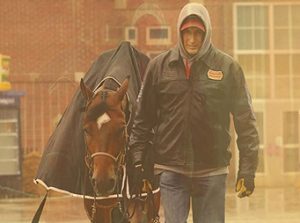Ask Not What Your Trainer Can Do For You…
Click here to read the complete article204 – March/April 2019
By Delores Kuhlwein
 When John F. Kennedy challenged society to do its part to contribute for the betterment of the world as a whole at his inaugural address in 1961, he did so by uttering the famous words, “Ask not what your country can do for you — ask what you can do for your country.”
When John F. Kennedy challenged society to do its part to contribute for the betterment of the world as a whole at his inaugural address in 1961, he did so by uttering the famous words, “Ask not what your country can do for you — ask what you can do for your country.”
He admittedly had a large-scale call to action in mind, but the idea behind his words can apply to just about any situation from which teamwork would benefit. For example, each training barn has its own culture, or small society within, so creating ownership for everyone in the barn environment can pay off in a big way.
Whether customers pay for full service or prefer to be hands-on at every show, contributing to the barn atmosphere and taking responsibility for certain tasks will make an impact, not only by helping meet a trainer halfway, but by creating pride in a rider’s own learning and success.
TIME IS OF THE ESSENCE
Being aware of the demands on a trainer’s time is one simple way to do your part, explains AQHA amateur Kirsten Thomsen of Rocklin, California. “Our trainers are juggling multiple clients and horses at the same time, so if you can get to the show or barn when they say, it helps everything go smoothly.”
“Remember, you’re not the only client your trainer has, so be respectful of their time,” agrees Laurie Mootz of Cottage Grove, Oregon, show mom of APHA amateur, Josie Mootz, who is on the TCU Equestrian Team.
Trainer Leslie Lange of Greeley, Colorado concurs that being on time and ready to ride at your scheduled time is one of the most helpful things a client can do, in addition to scheduling schooling times at shows. She says, “We’re usually at a horse show with 10-15 horses, and clients usually have just one, so we just ask for consideration of that big picture.”
Thomsen suggests also making sure your horse is properly warmed up, prior to lesson time. “I feel like that helps you and your trainer really use each other’s time better,” she says.
Click here to read the complete article204 – March/April 2019










